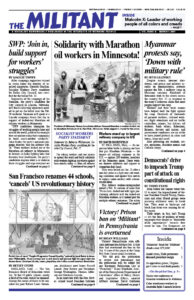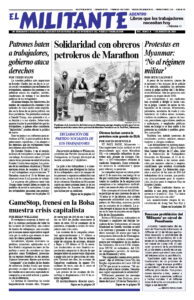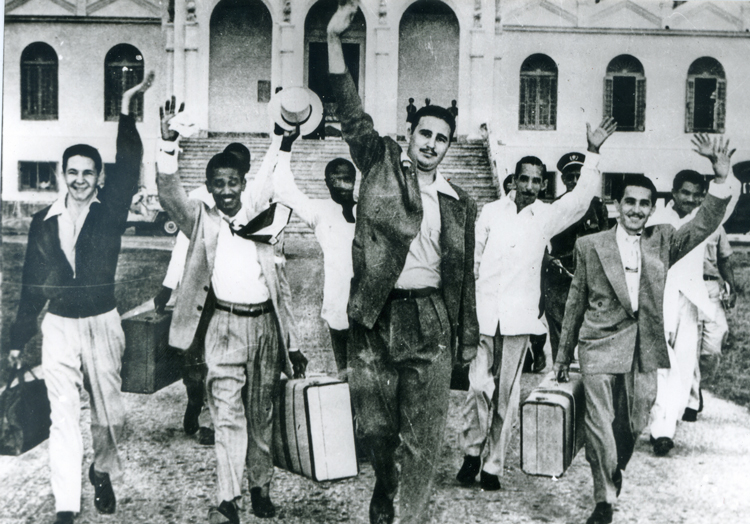One of Pathfinder’s Books of the Month for February is Our Power Is That of the Working People: Building Socialism in Cuba, a collection of historic speeches by Fidel Castro, the central leader of Cuba’s revolution. The excerpt is from “Defending Cuba’s Socialist Revolution,” given April 16, 1981, 20 years after he proclaimed the socialist character of the revolution as part of preparing the Cuban people to resist an imminent invasion organized by Washington. The Moncada program Castro refers to was his famous speech, “History Will Absolve Me,” delivered at his trial after the 1953 attack on the Moncada Barracks. It outlined the political and social goals of the revolutionary struggle. The July 26 Movement used this program to mobilize Cuban working people to victory on Jan. 1, 1959. Copyright © 1983 by Pathfinder Press. Reprinted by permission.
We commemorate today a very important date, April 16, 1961. On an afternoon like this, sunny and clear, we gathered in a solemn, revolutionary mass ceremony to bury the combatants that had died during the cowardly, criminal, and treacherous air raid launched by surprise against the airports of Ciudad Libertad, San Antonio de los Baños, and Santiago de Cuba. A huge crowd of members of the militia and the people as a whole gathered that afternoon. It was on the eve of the mercenary attack on Playa Girón. It had taken many months to organize everything and all was ready: the mercenary troops, the air raids, the publicity, the propaganda, the cover-up. The whole thing was organized by the U.S. government, the Central Intelligence Agency, and the Pentagon, but that wasn’t being admitted publicly.At that time many lies and myths were exposed, but also the affair taught us a lot. It wasn’t like today when after twenty years of revolution our people are much better prepared and better educated politically, with a better understanding of the world’s social and political problems. But those outrageous, shameful events taught our people a lot. It was at that time that the socialist nature of our revolution was proclaimed, [Applause] and there couldn’t have been a better opportunity for it, since another lie was also current: that our people had been deceived, that they had been betrayed by their leaders.
By that time, we could say that the Moncada program had been completed. [Applause] All the laws passed during the first years of the revolution were laws and measures proclaimed in essence in the Moncada program, since it contained the seed, created the conditions for a socialist revolution. [Applause] And in our country at that moment there could have been no revolution other than a socialist one, [Applause] if any of us were real revolutionaries.
Our enemies said that our struggle against Batista’s tyranny had been for another kind of revolution. But at the very moment when we confronted the most powerful enemy, Yankee imperialism; when we resolutely confronted their plans and their forces; on the very eve of battle, when the people prepared once again to struggle, to shed their blood and die, the socialist nature of the revolution was proclaimed.
And no one knew what that struggle would cost, because if the mercenaries had not been defeated immediately, in less than seventy-two hours, thus preventing them from establishing a beachhead, with a solid territory in their hands and with a so-called provisional government which — as the dispatches said — would be immediately recognized by many governments, that struggle could have cost our country hundreds of thousands of lives. And yet our people did not hesitate; they got ready and struggled with all their might, struggled and shed their blood during those heroic days for the socialist revolution of Cuba. [Applause] The struggle for the socialist revolution, for the revolution of our people in that historic period, for the only real revolution, had been the struggle, in one way or another, of all those who had died since the last century for the freedom of our country: those who struggled for independence, struggled for a just revolution — which at that time was a revolution of independence that could not yet have been a socialist revolution; those who struggled throughout the period of the pseudorepublic, who struggled at the Moncada, on the Granma expedition and in the mountains, those who struggled in the underground; they were all in one way or another struggling for the only just revolution: the socialist revolution. But those who struggled at Girón struggled directly for the socialist revolution.
At that time I said: “What the imperialists cannot forgive is that we are here, what the imperialists cannot forgive us for is the Cuban people’s dignity, their integrity, their bravery, their ideological strength, their spirit of sacrifice, their revolutionary spirit … and that we have made a socialist revolution right under their noses, under the nose of the United States itself … [Applause] and that we are defending that socialist revolution with these guns, and that we are defending that socialist revolution with the same courage shown by our antiaircraft gunners yesterday as they riddled the enemy planes with bullets. And we do not defend that revolution with mercenaries, we defend it with men and women of the people.”
“Who has the weapons?” I asked then. … Whose hands are these that raise the weapons? … Aren’t they workers’ hands? [Shouts of “Yes!”] Aren’t they peasants’ hands? [Shouts of “Yes!”] Aren’t they hands calloused by work? [Shouts of “Yes!”] Aren’t they hands that create? [Shouts of “Yes!”] Aren’t they the humble hands of the people? … Do the poor have the weapons? [Shouts of “Yes!”] Are the privileged the minority? [Shouts of “Yes!”] Are the poor the majority? [Shouts of “Yes!”] Is a revolution in which the poor have the weapons democratic?” [Shouts of “Yes!”]
Then I continued: “Comrade workers and peasants: this is the socialist and democratic revolution of the poor, with the poor, and for the poor. And for this revolution of the poor, by the poor, and for the poor we are ready to give our lives.” [Applause] …
Thus the socialist nature of our revolution was proclaimed that day. Exactly twenty years have passed and we have the same answers to the same questions; faced with the same threats, the same people have the same determination to struggle and to win.


